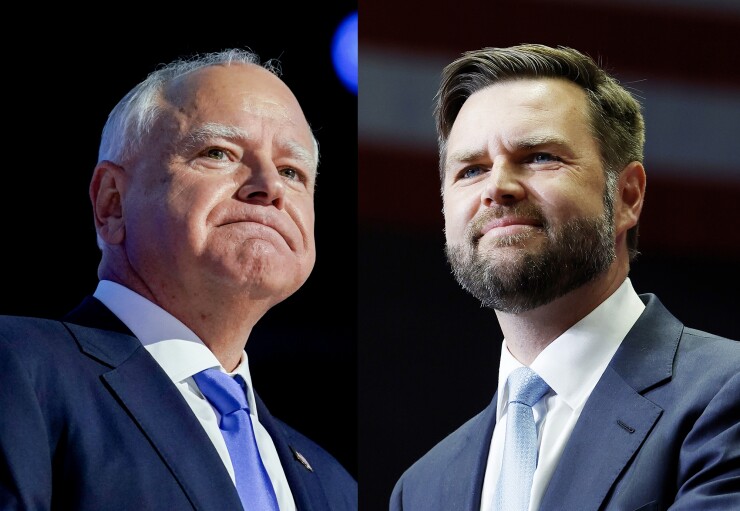The vice presidential nominees courted chief executive officers in dueling meetings in Washington, as the two campaigns seek to win over major business leaders in an exceedingly tight race.
The separate meetings on Thursday with Republican JD Vance and Democrat Tim Walz at the corporate-friendly Business Roundtable — a group representing chief executive officers from some of the largest American companies — highlighted how the campaigns of Donald Trump and Kamala Harris are both seeking to bolster their economic credentials with less than 50 days before the election.
Executives slated to attend the meetings included Mary Barra of General Motors, Home Depot Inc.'s Ted Decker, Jon Moeller of Procter & Gamble Co. and Cisco Systems Inc.'s Chuck Robbins.

The Harris-Walz campaign said in a statement that the Minnesota governor spoke to about 100 CEOs, where he highlighted "Vice President Harris' commitment to advancing practical, pro-growth, and fiscally responsible economic policies," drawing "a strong contrast against Donald Trump."
In his meeting, Vance touted Trump's pledges to lower taxes and argued for the Republican nominee's tariff policies, according to a person familiar with the conversation who spoke on condition of anonymity to detail the meeting.
Trump has vowed to renew expiring tax cuts and lower the corporate tax rate even further, to 15% from 21% — proposals which have won him support from business leaders. But his plans to hit U.S. allies and adversaries alike with trade levies threaten to upend global trade. Mainstream economists argue Trump's trade agenda could amount to a tax increase on US households, raising prices on a broad range of goods.
The person said Vance also discussed energy policy, casting affordable, abundant energy supplies as critical to domestic manufacturing — and highlighting the importance of swing-state Pennsylvania, which is experiencing an energy boom thanks to fracking. Vance also discussed the need for the U.S. to gain an edge in emerging technologies, such as artificial intelligence, according to the person.
Vance and Walz are set to take the same stage at an Oct. 1 debate hosted by CBS News, in what could be the final time the presidential or vice presidential candidates appear together before the Nov. 5 election.
Since replacing President Joe Biden as the Democratic nominee in July, the Harris campaign has boosted outreach to the business community. Second Gentleman Doug Emhoff has emphasized this message with wealthy donors at a series of fundraisers, calling Harris a "pro-growth" capitalist who understands corporate America's needs.
Trump spoke to the Business Roundtable in June, where he pledged to lower the corporate tax rate and slash federal regulations — two key priorities for the group's members. Biden, who at the time was the Democratic nominee, was invited to speak, but White House Chief of Staff Jeff Zients spoke in his stead.
Harris has taken a softer approach with businesses than Biden, rolling out campaign policy plans that would provide deductions for startups and scaling back the capital gains tax hike plan Biden endorsed.
The Business Roundtable is among the many executive and corporate groups who strongly denounced Trump after his supporters sought to overturn the 2020 election.
Still, many business leaders and deep-pocketed donors have been dismayed by Biden's record on inflation, regulations and foreign policy, and they've opted to make the bet that a Republican will be a better steward of the economy — even if some privately worry about his temperament or threats of retribution against opponents.





